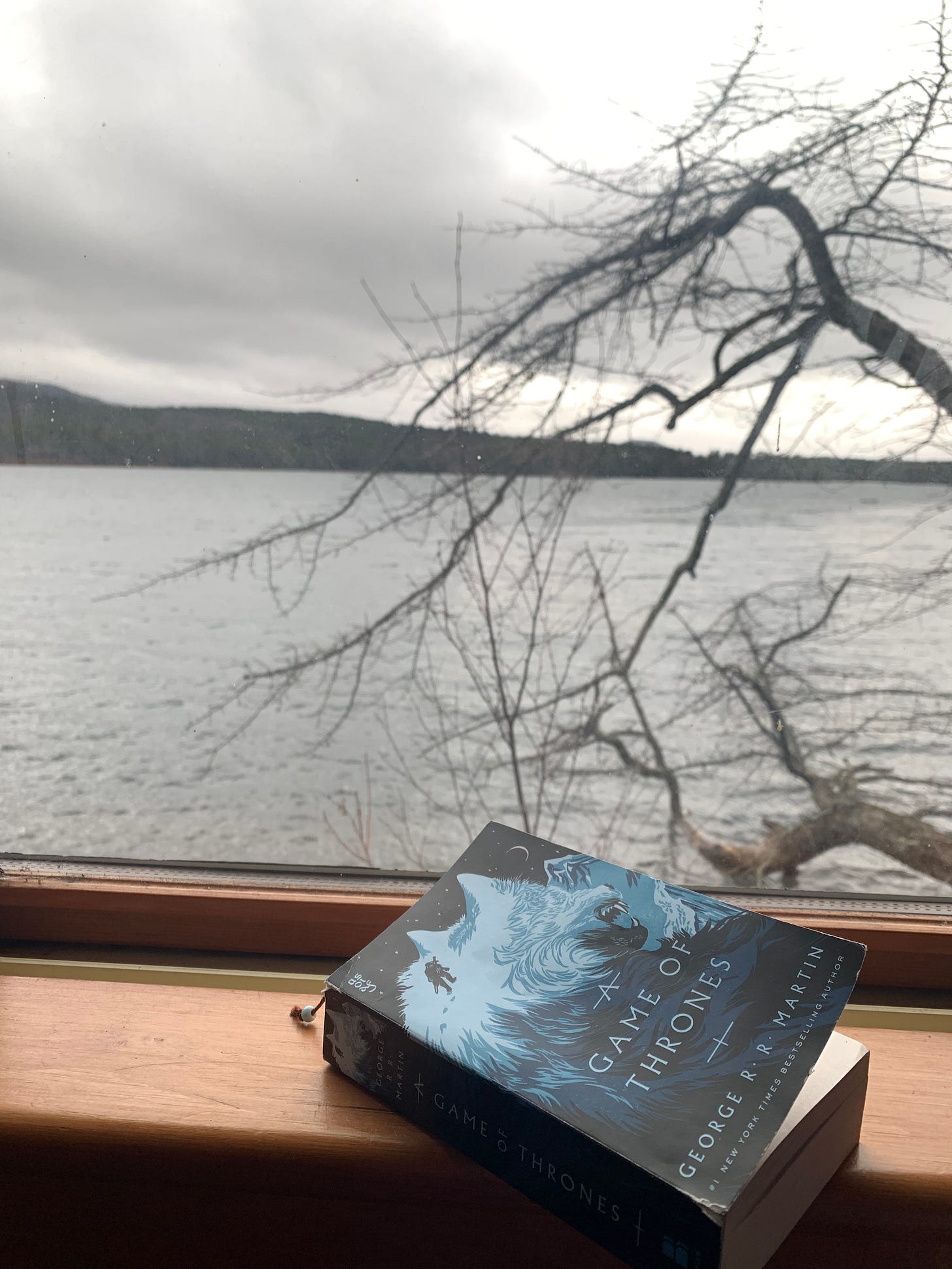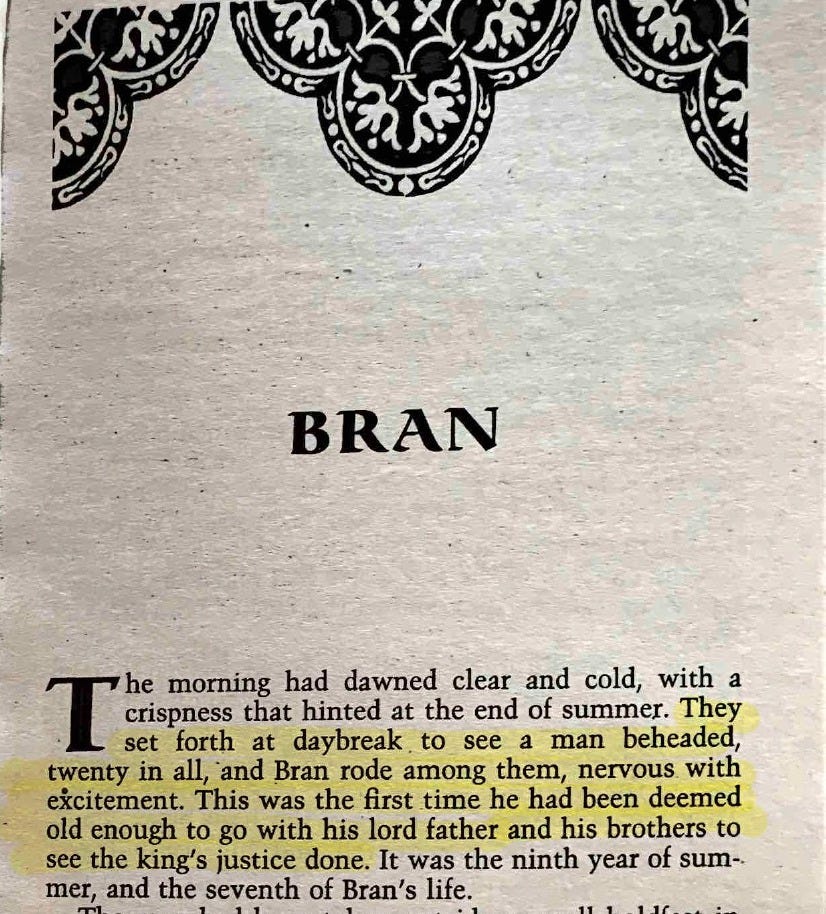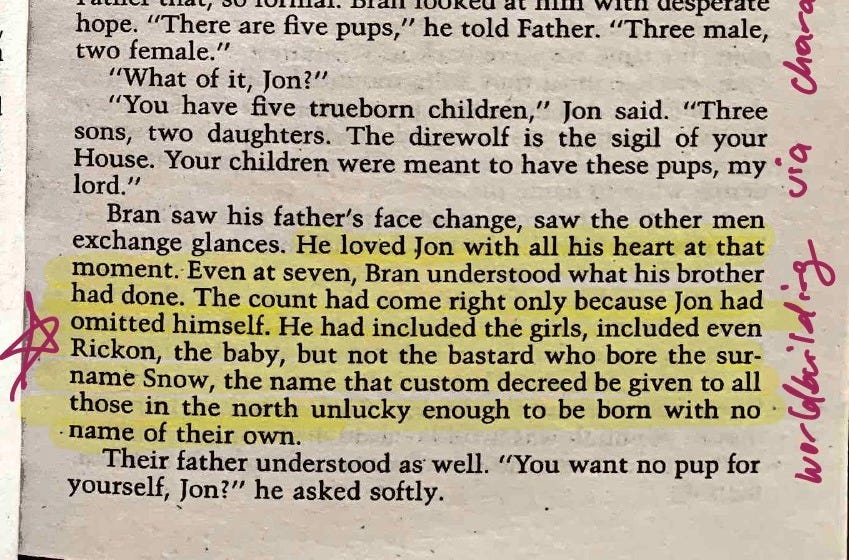In the midst of insomnia brought on (in part) by the election buildup and shitty fallout, I picked up a mass-market copy of George R.R. Martin’s A Game of Thrones, which I first read at the tender age of nineteen. I was looking for something nostalgic and, well, cozy. Yes, cozy.
I don’t remember much about that first reading experience, except that I was very invested in the writing and characters and also very disappointed in the downplaying of magic in this fantasy world. The dragons were only skeletons, and the gods, unfeeling. (The series is not without magic, but it is a slow build.) Moreover, the world was cruel. If, as Ted Chiang has proposed, the difference between science fiction and fantasy is that in fantasy, the universe cares—the universe quests into our souls and selects certain individuals to be important—well, in A Game of Thrones, the stars were distant, and cold.
I was lonely in my early college years, toiling at the task of forming an identity, mourning my childhood, yadda yadda, and reading long books at a rate I’ve seldom matched since. I kept a journal, eyed the world through my camera lens. I related a little too strongly to Jon Snow, stuck at his post at the end of the world.
Ned Stark’s death—I’d say spoilers, but c’mon—is also one of the handful of times I’ve literally thrown a book across the room. The most recent book-throwing, not to be confused with a book launch, was when I finally became rather offended and gave up on Hanya Yanagihara’s A Little Life. Anyway, I was angry enough at Ned’s beheading that I did not pick up A Clash of Kings, the sequel in Martin’s Song of Ice and Fire series, no matter how curious I was about the fates of the characters I’d grown so attached to.
A Game of Thrones (GoT) opens with a trio of characters who die one by one. This is a warning, and a promise. It’s hard to remember GoT before the hype, but initial readers did not know how much death would animate the story; Martin announces the tone and thematic territory here, in the prologue.
I love the description of Ser Waymar Royce’s dress, above, which is when the eye of the story lingers so as to catch all the details. Not only is his wardrobe expensive, it is recently purchased. This man is new and yet he’s in charge—why’s that? Well, he is the knight, and this is no meritocracy. He has the pedigree and he looks the part.
That won’t save him, of course.
“It is hard to take orders from a man you laughed at in your cups, Will reflected…”
(Indeed, looking the part is always suspect in GoT, we will come to find. The handsome knight Jaime sleeps with his sister and defenestrates children. His brother Tyrion is the real hero, although he does not fit the trope’s mold.)
The reader may flip pages primarily in response to the rising tension, from the deepening cold and sense of unease, wanting to know what creature lurks in the snow—but as they read for the plot, they pick up on the social dynamics of this world (as well as the lore and other factoids we tend to think of when we think of “worldbuilding” and “exposition”). What kind of world is it? GoT is the type of fantasy in which the knights giving orders don’t know what the hell they’re talking about, and are likely as not to lead you, common man, to your grave.
Also, the longest of long arcs is introduced: the frozen dead are waking, and walking south.
Every story’s beginning contains its ending, and so we begin with this one with a beheading.
Chapter 1, in young Bran Stark’s POV, kills the last of the prologue’s trio of guys. The reader has a lot to track, with many new characters and foreign terms (some explained, some merely mentioned), yet they aren’t overwhelmed with information. As with the prologue, the action of this first proper chapter is simple: in this case, the man is beheaded, and the orphaned direwolf pups are found. But what really keeps the chapter moving light on its feet is the strength of the POV. The scene is grounded at the human scale, focused on Bran’s excitement and intimidation at being included in this gruesome rite. What’s important is what’s important to Bran. He must sit tall on his horse. He must not look away when his father, Ned Stark, beheads the deserter: “Father will know if you do,” Jon Snow instructs.
This beat above does great double-duty. Jon saves the direwolves by sacrificing his position, which establishes his quick-thinking and goodness AND by-the-by explains his last name and bastard status. Bran notices this sacrifice, and loves Jon for it, displaying empathy. Ned Stark notices too, yet allows it to unfold.
Small, specific contrasts draw out the inequalities: Jon calls Ned Stark “Father” when one-on-one with Bran, whereas he says “my lord” when before the larger group. People wear different stances in different situations. As with the prologue, power dynamics shape the interaction, forming the secret subject of the scene. By the end of the chapter, the reader is primed to attend to power—who has it and who doesn’t—as the mover of this world.
Since last time…
Although my suspicion that I’d be left without answers/satisfaction was confirmed, re: I Who Have Never Known Men, by Jaqueline Harpman, I still am happy I read it. I’d say if you want something philosophical and quiet you may enjoy this strange, short novel.
I can’t believe I forgot to mention reading Benjamin Labatut’s When We Cease to Understand the World (translated by Adrian Nathan West) given that this August/September I chatted about it to everybody! This is a “hybrid genre” book about real physicists and mathematicians, but that becomes gradually more fictional as the page count rises. With the exception of Carmen Maria Machado’s In the Dream House, I’m never entirely sure what to put into the “speculative nonfiction” box, but When We Cease to Understand the World might belong in that interesting category. There were parts of this book I adored and parts (the middle) I found repetitive and overwrought (the women were not written well, what’s more). That said, I recommend it. My husband and I like to read books aloud to each other on long car trips, and this book was perfect for that, because it sparked many nerdy discussions.
What are you out there in the void reading? GoT nudged in front of my TBR, but I’m in need of a new audiobook. Any suggestions for my winter walks and procrasti-cleaning spells?
Amanda⋆𐙚₊˚⊹♡









I haven't read GoT (actually, Rhia and I often remark on it being one, among many, cultural touchstones that we fully missed out on) - your description makes me want to give it a chance though!
Have you written about your dislike (?) of A Little Life somewhere? I adore that book, and it is among the longest books I have read multiple times. There is so much love interlaced within the hardships in that story.
Agh… I’m forced to face the fact that, eventually, I’ll have to read Game of Thrones